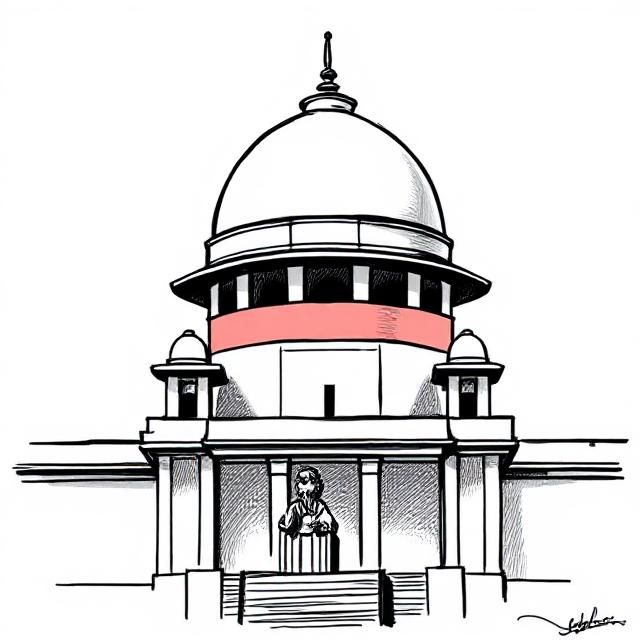The Supreme Court of India seems to be in favour of decriminalising defamation, a Damocles’s sword that hangs over much of the media.

Here’s an article outlining the Supreme Court’s recent “BIG remark” about defamation law — what led to it, what it means, and what could follow. If you like, I can also send a shorter version for publication.
Table of Contents
Toggle“Time Has Come to Decriminalise Defamation”: What the Supreme Court Just Said
What Happened
On 22 September 2025, the Supreme Court of India made a significant observation in a case involving the news portal The Wire and Amita Singh, a retired professor from Jawaharlal Nehru University. (www.ndtv.com)
The case stems from an article published by The Wire in 2016, which alleged that Amita Singh led a group of JNU teachers in compiling a dossier — described controversially — that accused the university of supporting separatism and related activities. Professor Singh filed a criminal defamation suit in response. (www.ndtv.com)
While hearing a plea challenging the summons in this defamation suit, a Bench (Justices MM Sundresh and Satish Chandra Sharma) remarked:
“I think the time has come to decriminalise all this…” (Moneylife)
They issued notice to Professor Singh based on a petition by the Foundation for Independent Journalism (which runs The Wire). (Business Standard)
What the Law Currently Is
- Defamation is a criminal offence under Section 356 of the Bharatiya Nyaya Sanhita (BNS). This replaced earlier Indian Penal Code Sections 499 and 500, which also dealt with defamation. (Business Standard)
- In 2016, in the Subramanian Swamy vs Union of India case, the Supreme Court had upheld the constitutionality of criminal defamation, saying that reputation is part of the right to life and dignity under Article 21 of the Constitution, and that criminal defamation is a “reasonable restriction” on free speech under Article 19. (India Today)
Why This Remark Matters
- It signals a possible shift in thinking at the highest judicial level: moving from acceptance of criminal defamation toward questioning whether it should remain part of criminal law.
- This could have wide‐ranging consequences for media houses, journalists, public figures, and ordinary citizens, especially in how allegations, criticism, or reporting are handled.
- The remark recognizes concerns that decriminalising defamation might be needed to protect freedom of expression and journalism, and to avoid misuse of defamation laws to intimidate speech. The Wire’s senior counsel, Kapil Sibal, agreed with this perspective. (www.ndtv.com)
Counterpoints & Previous Position
- There has been strong support for retaining criminal defamation from other quarters. For instance, the 22nd Law Commission in 2024 recommended retaining criminal defamation in the law, while also introducing alternatives such as community service as possible punishment. (Hindustan Times)
- The Supreme Court in Subramanian Swamy vs Union of India (2016) rejected the idea that criminal defamation impinges unreasonably on free speech, establishing firm precedent upholding it. (The Hindu)
Possible Outcomes & What May Happen Next
Here are some scenarios and implications of decriminalising defamation (if the Court moves forward in that direction) and what might need reform:
| Area | What Change Might Be | Possible Impact / Concerns |
|---|---|---|
| Legislative reform | Parliament would have to amend or repeal the defamation provisions in the BNS (or whatever criminal statute) to remove criminal penalties. | Could take time; political resistance likely from those who use defamation laws for protection. |
| Alternative remedies | Greater reliance on civil defamation – damages, injunctions – or other non-criminal remedies (community service was suggested by the Law Commission). | Civil court cases can be slow and expensive; there are issues of proving reputation loss. |
| Free speech and journalism | Journalists might operate with greater freedom; criticism of public figures could increase without fear of criminal sanctions. | Also risk of defamation without adequate recourse for those defamed. |
| Misuse and chilling effect | Removing criminal penalties could reduce misuse as a tool to harass or silence critics. But, civil actions might also be misused. | Need to balance protecting reputation and preserving expression. |
| Constitutional jurisprudence | Could lead to revisiting past judgments, or setting new precedents about what restrictions on speech are reasonable under Article 19. | The Court must ensure any new rule avoids arbitrary curbs and retains due process. |
Challenges & Considerations
- Even if criminal defamation is decriminalised, there is a need for strong civil law protections so reputation can still be defended, but without the threat of jail or criminal sanctions.
- Ensuring access to speedy, affordable civil justice. Often, slowness or high costs make civil remedies less accessible.
- Safeguards to prevent frivolous or vexatious cases in civil courts.
- Clarity on exceptions and defences: e.g. truth, fair comment, public interest, qualified privilege.
- Balancing with rights under other laws (e.g. privacy, data protection) and in digital contexts.
Why Now
Several developments have likely made this a ripe moment:
- Rising concern over freedom of expression, especially online, and the fear that criminal defamation is used to stifle dissent.
- Changes in law: The move from IPC Sections 499/500 to BNS, and legal reforms in general, which invite reconsideration of older laws. (Business Standard)
- Law Commission’s report (though recommending retention) has introduced concepts like community service, indicating openness to reform. (Hindustan Times)
- Global trends: many democracies do not criminalise defamation, or restrict criminal defamation very tightly, preferring civil remedies.
Conclusion
The Supreme Court’s remark—“the time has come to decriminalise defamation”—marks a potentially momentous shift in Indian law and public discourse. It doesn’t yet change the law, but it strongly suggests that the Court is ready to entertain challenges to criminal defamation, perhaps even to strike it down in part or wholly.
Whether this leads to de jure reform (legislative) or de facto change (judgment limiting scope) remains to be seen. For media, critics, academics, and citizens, this is a development worth watching closely.
